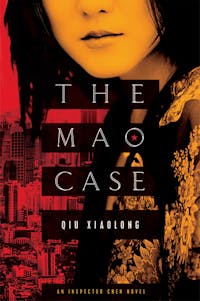The Mao Case
An Inspector Chen Novel
 Download image
Download image
ISBN10: 0312601239
ISBN13: 9780312601232
Trade Paperback
304 Pages
$20.99
CA$29.50
Chief Inspector Chen Cao of the Shanghai Police Department is often assigned cases considered politically "sensitive," and now the Minister of Public Security insists that Chen personally take on a 'special assignment.' Leery of international embarrassment, the party is concerned about rumors related to Chairman Mao. Jiao, the granddaughter of an actress who had a 'special relationship' to Mao has moved into a luxury apartment and become involved with a new social set centered around the remnants of pre-Communist Shanghai society. All without any visible means of support.
Worried that Jiao has inherited some sort of artifact that could prove damaging to Mao's reputation, Chen has been given a few short days to infiltrate her social circle, determine if the feared material exists and, if it does, retrieve it quietly. And if he fails to solve this 'Mao case,' the consequences will be unpleasant for all concerned.
Reviews
Praise for The Mao Case
"[Qui's] lauded series of contemporary Shanghai crime novels . . . feature Chief Inspector Chen Cao. Like Qiu, Chen works as a translator, writes poetry, and maintains an ambiguous relationship with the ruling party. Qiu's debut novel, Death of a Red Heroine, won the prestigious Anthony Award for best first novel by a mystery writer and was ranked as one of the five best political novels of all time by The Wall Street Journal . . . Though ostensibly police procedural dealing with mayhem and malfeasance—albeit laced with classical Chinese poetry and the wisdom of Confucius—the novels' true subjects are Shanghai and the Communist Party. Though in his heart he wishes to be a poet and literary scholar, Chen has been forced into police work by the party. Likewise, Qiu, who was on a similar scholarly path, made an abrupt turn into English-language crime fiction credited in large part to the 1989 Communist crackdown after the Tiananmen Square protests. 'I came to St. Louis and Washington University in 1988 because of T.S. Eliot,' Qiu says. A Ford Foundation exchange scholar, he had already translated The Waste Land, The Love Song of Alfred Prufrock and other Eliot poems into Chinese. Qiu thought that his ongoing work on Eliot might be enriched by coming to the poet's hometown and to the university founded by Eliot's grandfather . . . He made a life in St. Louis with his wife, Wang Lijun, and daughter, Julia Qiu, teaching, translating and earning his doctorate in comparative literature from Washington University in 1995. Meanwhile, life back in China was changing dramatically. With the economy mushrooming and standard of living advancing, Qiu saw that the once-reviled capitalists had morphed into an honored class. He sought to chronicle those changes. 'My first book was meant to be about Chinese culture in this new age,' Qiu says. But as he sought a frame for the novel, he drew on his affection for mysteries and on the true crime stories he had encountered in his previous contacts with a Shanghai magazine. 'I like mystery. Maybe I can use that as a framework, I told myself,' Qiu says. 'It served my organizational purpose. And it is very easy for a cop to move around and ask questions and read documents others cannot.' He styled Chen as 'a thinking cop and an intellectual, not just someone who finds out who did it,' Qiu says, 'but also the cultural and social circumstances surrounding the crime' . . . His Inspector Chen novels give Qiu a way of understanding and accepting the past and present, he says."—Rick Skwiot, Washington Magazine
"Stylistically cadenced and charmingly mannered . . . very clever."—Winnipeg Free Press
"No one writes about modern China, still dealing with the residual effects of the Cultural Revolution and the larger-than-life image of Mao, with the sensitivity and caring of this author."—Library Journal (starred review)
"Full, as always, of crisp detail and vivid atmospherics."—Booklist
"Qiu's deftly paced suspense keeps the reader flipping pages."—Publishers Weekly



